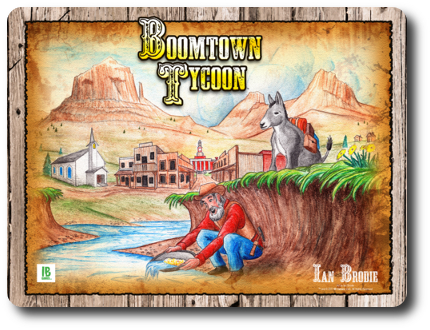
The Basics:
- For ages 9 and up (publisher suggests 12+)
- For 2 to 4 players
- Approximately 60 minutes to complete
Geek Skills:
- Counting & Math
- Logical & Critical Decision Making
- Reading
- Pattern/Color Matching
- Strategy & Tactics
- Hand/Resource Management
- Trading
Learning Curve:
- Child – Easy
- Adult – Easy
Theme & Narrative:
- Rush to collect as much gold as possible by being as efficient as possible!
Endorsements:
- Gamer Geek mixed!
- Parent Geek approved!
- Child Geek mixed!
Overview
When you heard that gold was found in the ground, it was like someone kicked a hornet’s nest in your head. Your mind was abuzz with excitement and dreams of wealth! You quickly made your plans and went out West. Once you got there, however, you realized there was much more to gold mining than you knew. You must be business savvy, organized, and lucky. Oh, well, no millionaire was made in a day. Best get started because that gold isn’t going to mine itself!
Boomtown Tycoon, designed by Ian Brodie and published by IB Games, is comprised of 75 Basic Resource cards (15 “Brick”, 15 “Lumber”, 15″Pickaxe”, 15 “Food”, and 15 “Silver”), 55 Advanced Resource cards (10 “Labor”, 10 “Gun”, 10 “Leather”, 10 “Paper”, and 15 “Gold”), 25 Event cards, 25 Building cards, and 4 Player Reference cards for a total of 184 cards. The illustrations (while very basic) do an excellent job of representing the items portrayed by each card and the overall quality of the game is very good.
Game Set Up
To set up the game, first separate all the cards by type. When completed, there will be a deck for every Basic Resource type, Advanced Resource type, Event, and Building cards. In total, there should be 12 decks.
Second, deal to each player 3 “Brick”, 3 “Lumber”, 3 “Pickaxe”, 3 “Food”, and 3 “Silver” Basic Resource cards for a total of 15 cards. This is the player’s starting deck. Each player should give their deck a really good shuffle and set it to their immediate right. This is now referred to as the player’s “Prospector deck”. Each player should leave room next to their Prospector deck for a discard pile. Hand out the Player Reference cards at this time if needed.
Third, set all the Basic Resource cards (“Brick”, “Lumber”, “Pickaxe”, “Food”, and “Silver”) in a single row, face-up, in the middle of the playing area.
Fourth, set all the Advanced Resource cards (“Labor”, “Gun”, “Leather”, “Paper”, and “Gold”) in a single row, face-up, directly below the Basic Resource cards row. These two rows are now referred to as the “Resource stack”.
Fifth, shuffle the Event deck and place it on one end of the Resource stack, face-up. Draw the top 2 cards and place one on each side of the Event deck, face-up.
Sixth, shuffle the Building deck and place it on the other end of the Resource stack, face-up. Draw the top 2 cards and place one on each side of the Building deck, face-up.
When completed, your game play area might look like the following.
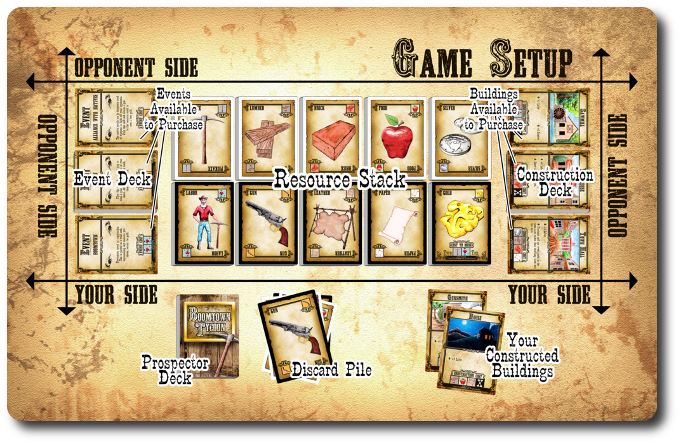
Seventh, every player should now draw the top 5 cards from their Prospector deck. This is the player’s starting hand. Players should look at their cards but keep them hidden from their opponents at all times.
That’s it for game set up. Let’s find us some gold!
Gold Rush!
Boomtown Tycoon is played in turns with no set number of turns or rounds in a single game. On a player’s turn, they have a number of actions available to them. There is no limit to how many actions the player can take on their turn. If the player has the cards, and wants to, they can continue to take as many actions as they like. Once the player is done, the next player in turn order sequence goes. The actions available to a player are summarized here.
Trade
If the player discards 1 “Silver” Basic Resource card, any 1 Basic or 1 Advanced Resource card in the player’s hand can be placed back in the Resource stack and any 1 Basic or 1 Advanced Resource card from the Resource stack (except the “Gold” Advanced Resource card) can be taken and placed in the player’s hand. The newly acquired Basic or Advanced Resource card can be played this turn.
If the player discards 1 “Gold” Advanced Resource card, they have three possible choices:
- Trade 1 Basic or 1 Advanced Resource card from their hand and replace it with any 1 Basic or 1 Advanced Resource card from the Resource stack. The newly acquired Basic or Advanced Resource card can be played this turn.
- Return 1 Basic or 1 Advanced Resource card from their hand to the Resource stack without collecting a new one.
- Take 1 Basic or 1 Advanced Resource card (except the “Gold” Advanced Resource card) from the Resource stack and add it to their hand without trading. The newly acquired Basic or Advanced Resource card can be played this turn.
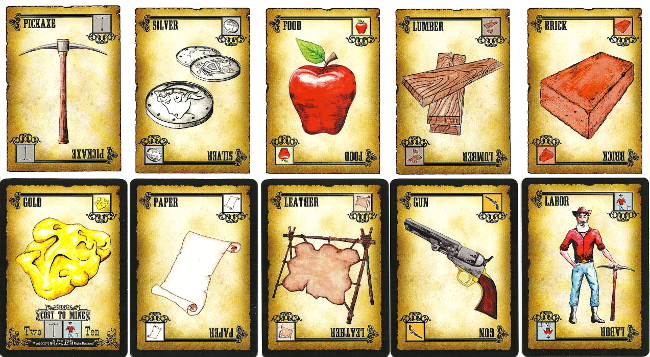
Basic Resources on the top row, Advanced Resources on the bottom row
Essentially, “Silver” allows for a 1:1 trade that does not increase or decrease the number of cards in the player’s Prospector deck, but “Gold” allows the player to increase or decrease their overall Prospector deck size.
Buy Buildings
There is a shortage of resources in the game and Building cards can be built to provide the additional resources the players need. Some Buildings also provide special actions and abilities. Only the 3 Building cards face-up at the end of the Resource stack are available for purchase. Each Building card shows a number of icons that match the Basic and Advanced Resource cards. This is referred to as the ‘Building construction cost”. An “X” indicates no resources. As such, a single Building could cost 2, 3, or even 4 specific Basic and Advanced Resource cards. If the player has the correct number and type of Basic and Advanced Resource cards in their hand, they show the Basic and Advanced Resources indicated on the Building card to their opponents and then discard them. The Building card is then collected and placed, face-up, in front of the player becoming immediately available to them. Buildings never go in the player’s discard pile or Prospector deck. When a Building card is taken by a player, a new Building card is drawn to replace it.
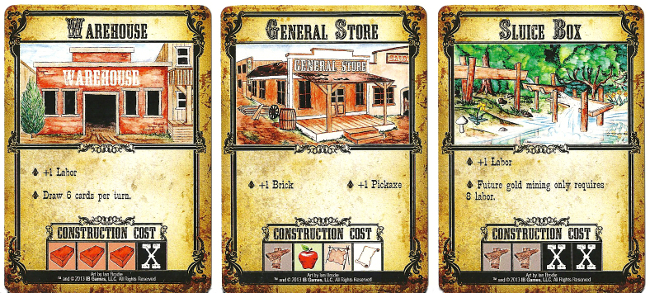
If the player uses previously built Buildings to provide resources, any resources the player uses from the Building are spent for the duration of their turn. We suggest a player “tilt” their Building cards when they use all the resources it provides to help keep track of what Buildings are still available for use.
Note: If all the players agree, any visible Building cards can be replaced with a new Building card from the Building card deck without being purchased. The replaced Building card is placed at the bottom of the Building deck.
Buy Events
Event cards are the “poor man’s version” of a Building card. They provide a bonus, but can only be used once.
Event cards must be purchased. Only the 3 Event cards face-up at the end of the Resource stack are available for purchase. Each Event card shows 2 icons that match the Basic and Advanced Resource cards. This is cost of the Event card. If the player has the correct number and type off Basic and Advanced Resource cards in their hand, they show the Basic and Advanced Resources indicated on the Event card to their opponents and then discard them. The Event card is then collected and placed in the player’s discard pile. When an Event card is taken by a player, a new Event card is drawn to replace it

Note: If all the players agree, any visible Event cards can be replaced with a new Event card from the Building card deck without being purchased. The replaced Event card is placed at the bottom of the Event deck.
Play Event
Previously purchased Event cards will eventually make their way into the player’s hand. The player can now play them or leave them in their hand to be played later. If the player does play their Event card, it’s placed in front of them, read out loud, and the effect resolved. The Event card is then placed at the bottom of the Event card deck located at one of the two ends of the Resource stack.
Mine Gold
Gold is the most important resource of the game and the objective. Because gold is so hard to come by, players cannot buy or trade for it. Instead, they must organize a large labor force to go out and mine for it. If a player has a total of 10 “Labor” and 2 “Pickaxe” resources (provided by the cards in their hand any Building cards they have in play), they can discard the resources and collect 1 “Gold” Advanced Resource card. The freshly mined “Gold” Advanced Resource card goes to the player’s hand and can be used this turn.
Cleaning Up
When is a player is done with their turn, they need to do a bit of clean up.
- Any cards still left in their hand are placed in their discard pile.
- Any tilted Buildings are tilted back to their original position and made ready for the player’s next turn.
- Any Event cards played are returned to the bottom of the Event card deck.
- The player draws 5 new cards from their Prospector deck. If the player does not have enough cards in their Prospector deck, their discard pile is shuffled and becomes the new Prospector deck.
The Mother Lode
The game continues until the last “Gold” Advanced Resource card has been taken from the Resource stack. The game now ends and all the players count how many “Gold” Advanced Resource cards they have collected. The player with the most “Gold” Advanced Resource cards wins the game. If there is a tie, it’s broken first on the total number of Building cards constructed and second on the total number of “Silver” Basic Resource cards.
To learn more about Boomtown Tycoon, visit the game’s web page.
Prediction
Deck-building games continue to be a big hit with the Parent Geeks and the Gamer Geeks, with mixed results from the Child Geeks. The complexity of building the “perfect machine” with the deck of cards seems to frustrate more than amuse the Child Geeks. The Parent Geeks and the Gamer Geeks always have a good time with games of this type and eagerly seek them out. I have no doubt the Parent Geeks and the Gamer Geeks will both approve Boomtown Tycoon unless the game play is found to be broken. As far as deck-building games go, Boomtown Tycoon is fairly tame and the level of complexity is significantly less than other deck-building games the Child Geeks have played. The game is still strategic and tactical, but the number of cards available and the ability to get the cards you want will most likely cool the hot tempers of the frustrated Child Geeks. At the least, Boomtown Tycoon is going to get a mixed vote for approval, but the door is open for full approval, as well. I’m excited to find out.
Like all deck-builders, players start each game with the same purpose and the same cards, but not the same hand. If the players at your gaming table are familiar with deck-building games, then you won’t have to put much effort into teaching Boomtown Tycoon. The game uses the same game mechanisms found in many deck-building games. Which is to say, collect cards, cycle them through your deck, and build an efficient deck that always provides the player with a strong hand. If your players do not have any experience with deck-building games, I think you’ll find Boomtown Tycoon to be a very easy game to teach. In fact, I think Boomtown Tycoon is the perfect “gateway deck-building game” for two very important reasons. First, the number of cards the player needs to be concerned about are limited. Second, the players can always get the cards that they need if they have the “Silver” for it and the card is available. This gives the players a lot of room to learn and change direction as they navigate the subtle difficulties that are inherent in all deck-building games.
After teaching the game to my oldest Child Geek, who knows how to play much more complicated deck-building games, I asked him his thought on Boomtown Tycoon so far.
“I really like the game’s theme and the rules to play are super easy. Let’s go get some gold!” ~ Liam (age 9)
Keep in mind that “easy” and “hard” are highly subjective terms. I have no doubt I’ll be reminding my little geek how to play the game from time to time despite his previous game playing experience. But Boomtown Tycoon is not overly difficulty as games go. The rules are very easy to understand and the game play flow is very crisp. This should make for a very enjoyable game for all involved. Let’s play Boomtown Tycoon and see if we strike gold or the game is a bust.
Final Word
The Child Geeks approached Boomtown Tycoon with a bit of skepticism. Their overall experience with deck-building games, as I mentioned in the prediction, has been mixed. I wouldn’t go so far as to say it was full of trials and tribulations, but I have yet to play a deck-building game that didn’t frustrate some of the Child Geeks to tears. It hurts to keep getting “bad cards” when everyone else at the gaming table seems to be getting the cards they want. As predicted, the ability for players to trade for the cards they wanted went a long way to help the Child Geeks get what they needed. Their decks were pretty good by the time the game was getting to an end and their little towns did a good job of making up for lack of resources in their decks. I was very pleased to see several of the Child Geeks “switch gears” midway through the game and start collecting different resources based on the Building cards they had out in front of them. This demonstrated a clear grasp of the game’s rules and how the game was played. The game does require its players to read, so any Child Geek who is not a strong reader will need to pair up with another player. Those Child Geek who did play the game by themselves were as young as 9-years-old and did well. When the cards were put away and the gaming table cleared, the Child Geek vote was mixed. The more advanced Child Geeks all understood the need to constantly manage and retool their decks to adjust to new Building cards. They were the strongest traders in the game and did the best. They voted to approve the game. According to one very enthusiastic Child Geek, “THIS GAME IS GOLD!” But the need to constantly retool and shift gears in the deck was found to be too “busy” by some of the older Child Geeks who did not approve the game. According to one very disgruntled Child Geek, “I spent three rounds trying to get just the right resources and someone buys the Building right before I can get to it. Frustrating!”
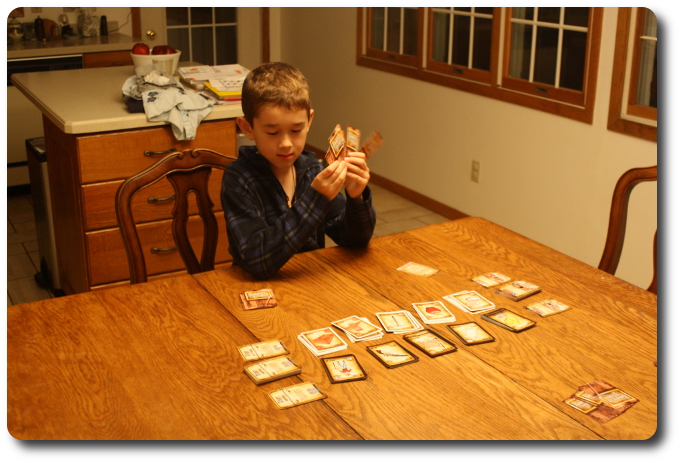
My little geek scans the table for a quick trade before he hits the hills to find goooooooooooold
The Parent Geeks had a wonderful time with the game. They greatly enjoyed the level of focus needed to build their decks and the race aspect that came of it. This was a hidden surprise for them that I didn’t want to reveal when I explained how to play the game. In Boomtown Tycoon, towns really do “boom”. Players must grab those Building cards super fast in order to get the necessary “resource batteries” to power their actions. This really appealed to the Parent Geeks and the Building deck was quickly drained. Oddly enough, the games went longer than expected. I thought for certain the Parent Geeks would find the quickest path and then sprint down it. I’ve seen them do this many times playing other deck-building games, but this was not observed. Instead, they took their time getting the right resources and focusing on building their towns. It was only at the end I started to see the Parent Geeks turn their full attention to the Gold. When they did, it was a frenzy. When the games were over. all the Parent Geeks voted to approve it. According to one Parent Geek, “This is the first deck-builder I”ve played in a long time that has me excited to play it again despite losing so very, very horribly.” Yeah, she did, and yes, she grabbed the cards and started organizing them for another game.
The Gamer Geeks quickly found the quickest path and slaughtered each other. Well, attempted to, at any rate. Boomtown Tycoon is a game that requires a lot of deck management. Labor is in short supply and players will need to constantly adjust the resources in their deck to get Building and Event cards so they can mine for gold. This left some of the Gamer Geeks feeling very cold towards the game. According to on Gamer Geek, “I think this game stays way too long at the table and limits the players way too much. I don’t mind building decks and managing them, but I found it ridiculous how often I retooling my deck.” Some of the Gamer Geeks found this aspect of the game play very interesting and loudly disagreed with the game’s naysayers. According to one of the game’s proponent Gamer Geeks, “This is what deck-building and hand management is all about! I really like how involved I have to get.” All the Gamer Geeks agreed that a 4-player game was not that great and could only be fixed if more Basic and Advanced Resource cards were made available. When the games were over, the Gamer Geeks were fairly mixed when it came to their approval. Some very much enjoyed the game, while others thought it was a game they would not like to play again.
After playing and observing Boomtown Tycoon throughout our review process, I have two concerns.
Fist, the game would seem to have limited replayability due to the small number of cards it contains. A player will see every card in their first game and the only random element is the order in which the Building and the Event cards appear. Two of the most popular deck-building games, Dominion and Thunderstone, have addressed this issue by flooding players with a large number of cards to play with. Different cards each game provide new engaging opportunities. Not the case with Boomtown Tycoon which always features the same cards. But we can put a positive spin on this. Since the order in which the Building and Event cards appear is always random, and the supply of resources will shift in the game, players will be challenged to find new ways to to gather enough labor to mine for gold. This might be enough to keep players coming back for more. While the game play is always the same, the path to victory is always different.
Second, the lack of resources actually hurts the game a bit, despite it being a major element to game play. In a 2-player game, there are a lot more resources to go around than there are in a 4-player game. The game does not address this by providing different number of cards per the number of players. This means a 4-player game will have a great deal more resource turnover than a 2-player game. The number of times a player was repeatedly trading for small number of resources was a major negative sticking point for some of our Gamer Geeks. I thought the best player count was 3 with the cards provided, as it still required players to manage their deck builds, but the resources were not so scares as to be overly difficult to obtain.
Overall, I found Boomtown Tycoon to be a lot of fun. It has some trouble spots, in my opinion, but the game kept me engaged and smiling. I think it plays best with 2 or 3 players. A 4-player game can take a longer time than some might feel is necessary due to the lack of resources.
This game was given to Father Geek as a review copy. Father Geek was not paid, bribed, wined, dined, or threatened in vain hopes of influencing this review. Such is the statuesque and legendary integrity of Father Geek.

